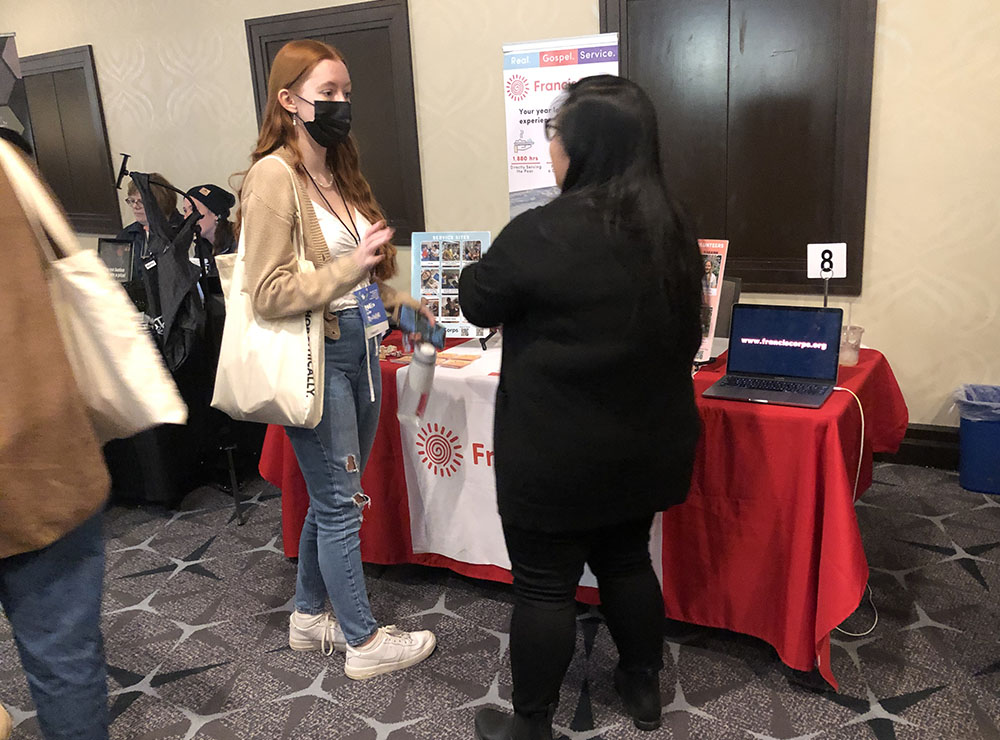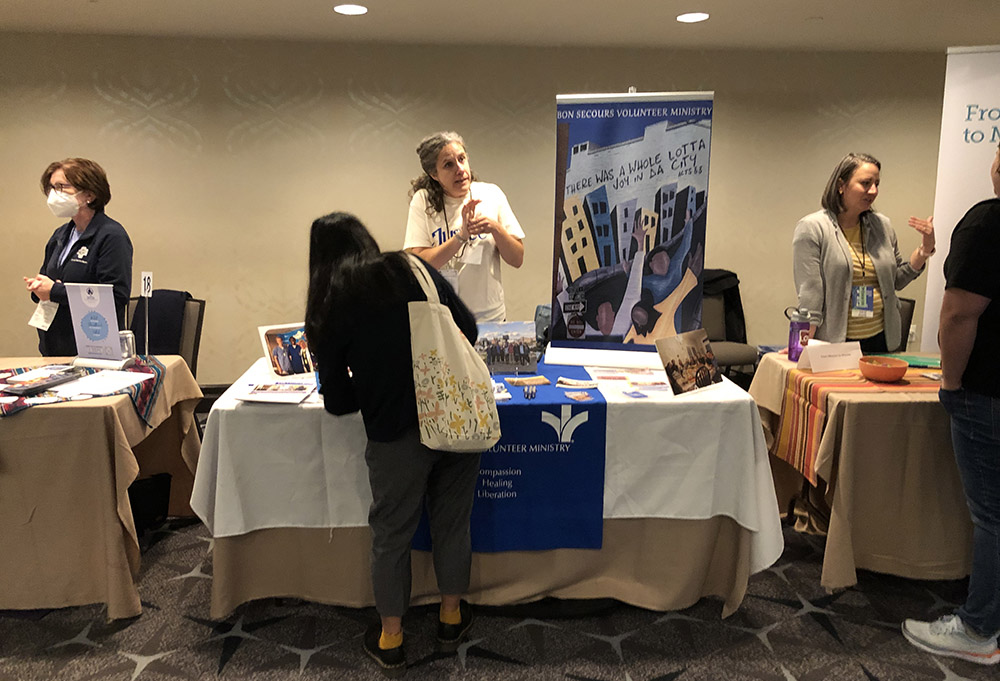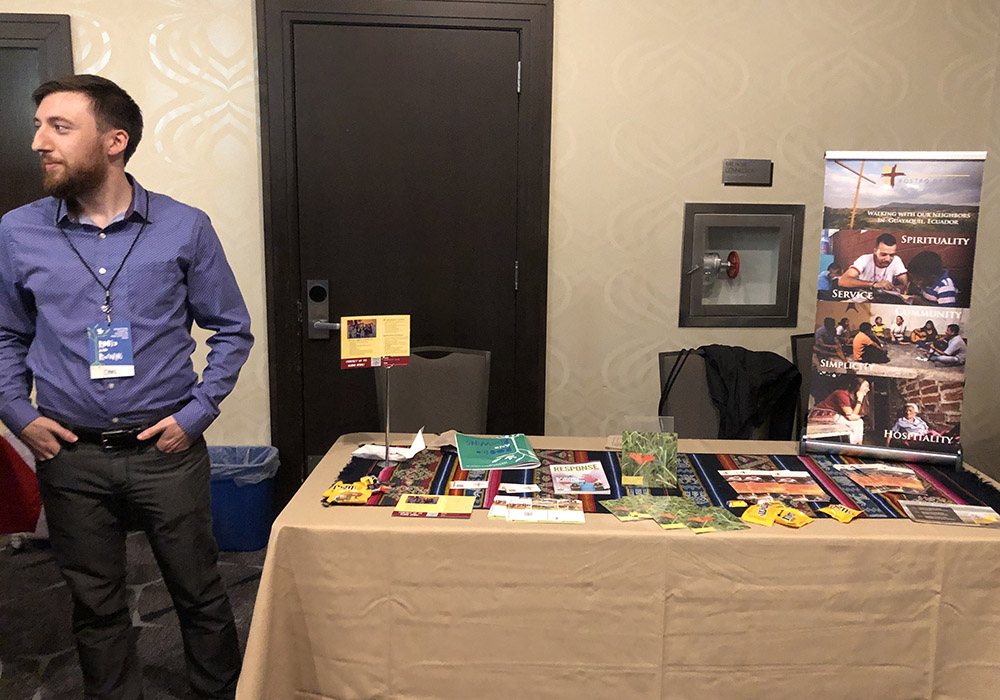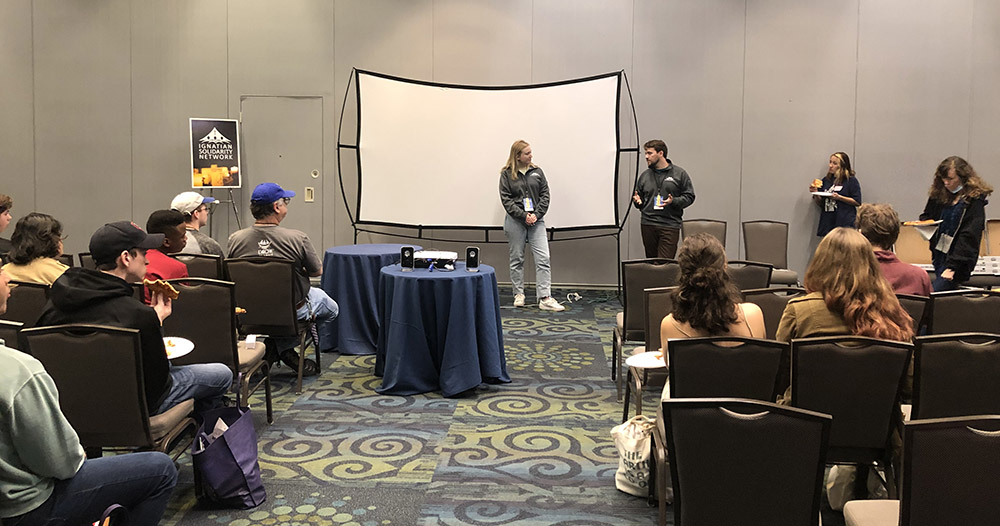
Jenny Rose Anacan, associate director of FrancisCorps, talks with Isabelle Marinchik at the FrancisCorps table at the Ignatian Family Teach-In for Justice in Washington, D.C., Oct. 23. (NCR photo/Aleja Hertzler-McCain)
Catholic volunteer programs for young adults, which typically send youths to live and serve in communities both inside and outside the U.S., largely struggled to adapt during the first phase of the coronavirus pandemic.
But as many return to in-person events in the third year of the pandemic, staff for the various volunteer programs are expressing hope that they will face fewer challenges as they recruit now for the 2023-24 volunteer year.
In interviews and conversations during and around the Oct. 23-25 Ignatian Family Teach-In for Justice, which gathered thousands of Catholic high school and college students in Washington for a series of keynote presentations and a lobbying day on Capitol Hill, volunteer staff also remembered how difficult recent volunteer years have been.
Emily Thrush, the site leader for Bon Secours Volunteer Ministry in Richmond, Virginia, said that many programs struggled to pivot to virtual recruiting when in-person events were canceled. She described the "commiseration" on Catholic Volunteer Network Zoom calls about "just how hard it was to engage with students."
Before the pandemic, Bon Secours had two volunteer houses, one in Baltimore and one in Richmond. During the 2020-21 year, both houses remained open with fewer volunteers in each house to maintain space if quarantine was needed. After that first pandemic year, there have not been enough volunteers to keep the Baltimore house open.
Rostro de Cristo, an organization whose volunteers live in Ecuador, went on a two-year pause because of the pandemic, resuming the program this summer. Other programs that stayed open have reported lower recruitment numbers.
Karen Bortvedt Estrada, Maryknoll Lay Missioners' recruitment and relationship manager, said that she links the pandemic to the high level of exhaustion she has noticed in her networks, which impacts "the creative energy it takes to make a decision about a major life change."
"Folks are just struggling," she said.

Emily Thrush, site leader for Bon Secours Volunteer Ministry in Richmond, Virginia, talks with Bianca Widjaja at the Bon Secours Volunteer Ministry table at the Ignatian Family Teach-In for Justice in Washington, D.C., Oct. 23. (NCR photo/Aleja Hertzler-McCain)
However, staffers said that service programs continue to be valuable experiences, even in years with recruiting challenges.
"It's a small and mighty group," said Thrush of this year's four Bon Secours volunteers. Amid the challenging climate, their organization also had to cope without a full-time recruiter for a year, although that position is now filled.
Bon Secours is currently supported by four staffers, three of whom are full-time. Thrush said that the "in-depth staff support" for spiritual formation, as well as the organization's health care volunteer opportunities, helps the program stand out to potential volunteers.
At the Ignatian Teach-In, Bianca Widjaja, a senior neuroscience major at the University of Notre Dame in Indiana, came by the Bon Secours table to talk to Thrush. She had been familiar with Bon Secours and other volunteer programs since early in her college career through the Center for Social Concerns at Notre Dame.
Now that Widjaja is considering a gap year before medical school, she is looking for a volunteer program with a health care placement.
Widjaja told NCR that her faith was "one of the biggest parts of this [decision] process." She said that she was praying to God for guidance about "where do I truly belong instead of focusing on ... what's going to look good on a résumé?"
Advertisement
Widjaja's discernment process mirrors the discernment process that volunteer program staff say they are trying to facilitate.
Rob Roa, director of recruitment for Jesuit Volunteer Corps, said, "Our recruitment model is one of accompaniment and to walk with young adults and to be present with folks end-to-end." The Jesuits had a networking lunch at the Teach-In, where current, former and potential volunteers could connect with each other.
Ana López, associate director of Rostro de Cristo, said the organization's focus on discernment reflects mutuality, one of their core values. That's "how we enter into relationship with the people in Ecuador that we're around, that we're living in community with," she said.
"We're not there to save people or fix them," said López, a former Rostro de Cristo volunteer. "We're really there to enter into a community with them."

A former Rostro de Cristo volunteer stands at the Rostro de Cristo table at the at the Ignatian Family Teach-In for Justice in Washington, D.C., Oct. 23. (NCR photo/Aleja Hertzler-McCain)
Alexander LaPoint, director of FrancisCorps, said that a potential volunteer is "a human being made in the image and likeness of God that we want to minister to."
He said the process is about "really considering where God is calling you to be. Is God calling you to this kind of experience or not? And if it's 'no,' that's OK, too."
In LaPoint's eyes, it's a "win" if someone has a good experience talking with FrancisCorps and gains a better sense of where they need to be.
In looking for people who are called to FrancisCorps, LaPoint said the service that FrancisCorps volunteers do is not the mission of the organization. "Our mission is the formation of young adults," he said.
Renewing a focus on that mission helped FrancisCorps have a record number of volunteers in Syracuse last year. LaPoint said that, after some years of lower application numbers, FrancisCorps staff reflected on how to lean into their emphasis on faith formation.
They decided to close a FrancisCorps house in Costa Rica when they felt they could not ensure that future volunteers would experience the relationships with Franciscans and community essential to the program. Additionally, in 2019, they transformed their retreat on the Franciscan charism into a pilgrimage to Assisi, Italy.
In the face of recruiting difficulties, many volunteer programs have reflected on barriers that make their programs inaccessible. FrancisCorps intentionally avoids language that implies service is only for college graduates and does not ask volunteers to fundraise to support their service.
"I feel like St. Francis would not love the idea that people were excluded because of wealth and because of access to finances," said LaPoint.

Anna Herrmann and other Jesuit Volunteer Corps staff speak to prospective Jesuit volunteers at a lunch at the Ignatian Family Teach-In for Justice in Washington, D.C., Oct. 23. (NCR photo/Aleja Hertzler-McCain)
The Jesuit Volunteer Corps has been similarly concerned with making service feasible for young adults with fewer financial resources. Roa said that volunteers can apply for a grant to cover outstanding bills, including student loans, medical bills or cellphone bills.
Maryknoll Lay Missioners commits to paying missioners' student loans while they are under contract and does not have individual fundraising requirements.
López said that the Rostro de Cristo team has been listening to the experiences of former volunteers who are people of color to learn "what's attracted them about our program and how can our program be more inclusive." She also emphasized that the program wanted to form all volunteers to be aware of their privilege as volunteers doing a year of service in another country.
While most of the volunteer programs at the Teach-In hoped to connect with young adults, Michael Goggin, the senior director for the National Capital Area of Ignatian Volunteer Corps, said he knew that the older and retired adults who normally serve with his organization wouldn't dominate the foot traffic at his table.
Unlike the service programs geared at young adults with a group-living, intentional community component, Ignatian volunteers live in their own houses and participate in service two days a week, along with a spiritual support program.
"If we can find some new members as a result [of being at the Teach-In], that's a great thing, but, you know, even if we don't, it's an important expression of solidarity with the justice that we seek," Goggin said.








